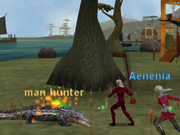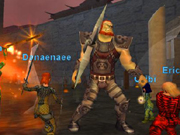Sony Online Entertainment's extremely popular and influential online role-playing game, EverQuest, strongly influenced this year's EverQuest Online Adventures, which debuted on the PlayStation 2 early this year. Though the original PC version of EverQuest launched way back in 1999, SOE has continued to expand that game through occasional free content downloads, as well as through a series of retail expansion packs, which added new areas to the game's vast world of Norrath, in addition to new character races, new abilities, and more. The recently released EverQuest Online Adventures: Frontiers brings this expansion-pack model to consoles. It's a stand-alone expanded, enhanced version of the original EQOA, and it's an opportunity for those who didn't try the game already to give it a shot. However, most of the new content in Frontiers is really only suited to the game's hardcore players, since it raises the ceiling on how powerful they can make their characters and gives them new high-level areas to explore. New players will immediately find in Frontiers a new race and character class, as well as some slightly improved visuals, but this expansion is still best-suited to those already addicted to EQOA.

Frontiers, like its predecessor, requires a network adapter, as there's no offline mode whatsoever, and, realistically, you'll also need a USB-compatible keyboard to communicate with other players. The game controls fine using a gamepad, and some chat shortcuts are available but certainly aren't enough to coordinate or communicate with a group of players. Moreover, unless you're willing to pay a monthly fee and are willing to invest many, many hours into learning the lay of the land, by looking for other players in the relatively sparsely populated world of the game and leveling up your character through countless, repetitive--though fast-paced--battles, then neither EQOA nor the Frontiers expansion pack is for you.
Without changing any of the fundamentals of EQOA, the expansion pack adds an appreciable amount of new content, in the form of a new character race, the ogre; a new character class, the alchemist; a higher level cap for high-level characters, who can now advance from level 50 up to 60; a new class mastery system, which allows high-level characters to differentiate themselves with special bonuses, unique skills, and abilities; and lots of new places to explore, between the newly added continent of Odus and the dangerous Plane of Sky. There are also lots of new items, monsters, spells, and other content to be found in Frontiers. Again, though, unless you've already (or until you've) invested dozens of hours into the game, you're unlikely to get to see or appreciate most of these additions.
Whether the time investment is worth it is questionable. Sure, there are no other such games currently available for the PlayStation 2, but in reality, Frontiers is competing in the long-since-oversaturated massively multiplayer RPG market on the PC. In fact, it's not so surprising that many hardcore EQOA players happen to be refugees of the original EverQuest, who looked to this new game for a chance to quickly excel within a world relatively unfettered by extremely experienced players. EQOA does attempt to tailor itself to a console-game-playing audience, and in so doing, it has some real advantages over other online RPGs. Namely, it features much faster action than EverQuest, and there's less downtime between battles. But, beyond the relative comparison, it's still a much more time-consuming, much more repetitive game than even the average console RPG. And, since EQOA--even with the graphical enhancements featured in Frontiers--really isn't much to look at, all that time spent staring at the lackluster graphics and typing at other player characters, won't necessarily translate into a good experience. It's too bad that EQOA doesn't support USB headsets for verbal communication between players.
The new content itself is pretty good. The ogres, though they look like big dwarves from the game's default third-person perspective, are somewhat stronger than the other races, though they're not substantially different to play as, in practice. Fans of the original EverQuest may be interested to know that Frontiers ogres can choose to be necromancers, as well as warriors, shadow knights, and shamans. EverQuest fans will also be interested in the new alchemist character class. Though alchemy has always been a trade skill in EverQuest--available to shamans--the alchemist is a full-fledged character class in Frontiers that specializes in battlefield support. From the get-go, alchemists can brew powerful, explosive potions that, when thrown, are functionally equivalent to a wizard's direct-damage spells. Alchemists can also buff their party members' resistances and things of that nature, thus bolstering their groups for battle.
Also, the previously mentioned class mastery system is rather complex and interesting, and it resembles the system introduced into the PC version of EverQuest in one of the later expansions. Essentially, high-level players can choose to divert a percentage of their experience points, earned from killing monsters and solving quests, into an alternate advancement pool. Eventually, you earn class mastery points, which can be spent on various skills intrinsic to your character. For example, specific skills may be available based on your character's race and class. You won't be able to buy them all, so you'll have to make some tough choices about how to specialize. Some of the class masteries are pretty compelling. For instance, paladins can learn to resurrect themselves when they die. But, again, don't even think about getting to the point of being able to learn these types of abilities until you've played the game for a long, long time. It's also worth mentioning that trade skills have been added to the world of EQOA, which means that you can take a break from all the monster-killing to try to stitch together leather jerkins or cobble together suits of armor by combining the necessary ingredients. It's eventually possible to make powerful, useful items, but this nonviolent pastime is every bit repetitive--if not more so--than the combat; it's just not as exciting.

The new graphical frills in Frontiers include little patches of grass and such, which give the miles and miles of plains and hills you'll be seeing in the game a bit more texture. You'll also see a new fog effect, and the player character models look a bit different than before but certainly don't look good by the PlayStation 2's standards. On its own visual merits, Frontiers looks rather ugly at times, and it suffers from frame rate problems in certain places, which--at worst--can lead you and your group to an untimely demise. Some aspects of the game do look decent, but overall, Frontiers looks mediocre. It sounds better, though battle effects are simple and repetitive. There are some new orchestral music pieces that have been added as well. These compositions are actually quite impressive, but since they accent the disappointing graphics and start and stop abruptly, they just come across as overblown.
Frontiers is a substantive expansion pack that's worthwhile for dedicated fans of EQOA--most of whom have already purchased it. Anyone else who's otherwise interested might as well pick up a copy of the original EQOA from the bargain bin first. Then they can take the 30-day free trial and see if they still want to keep leveling at the end of it.